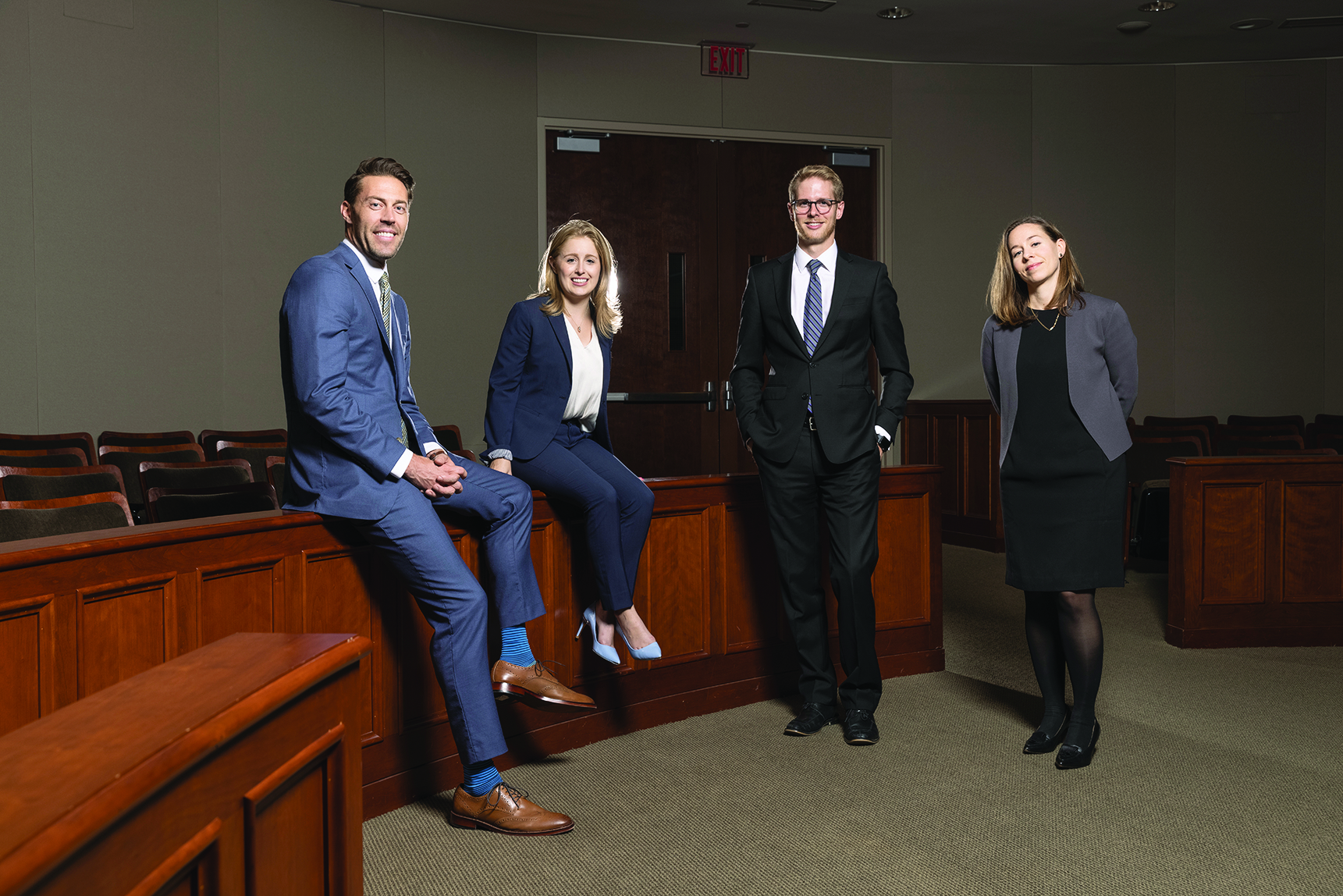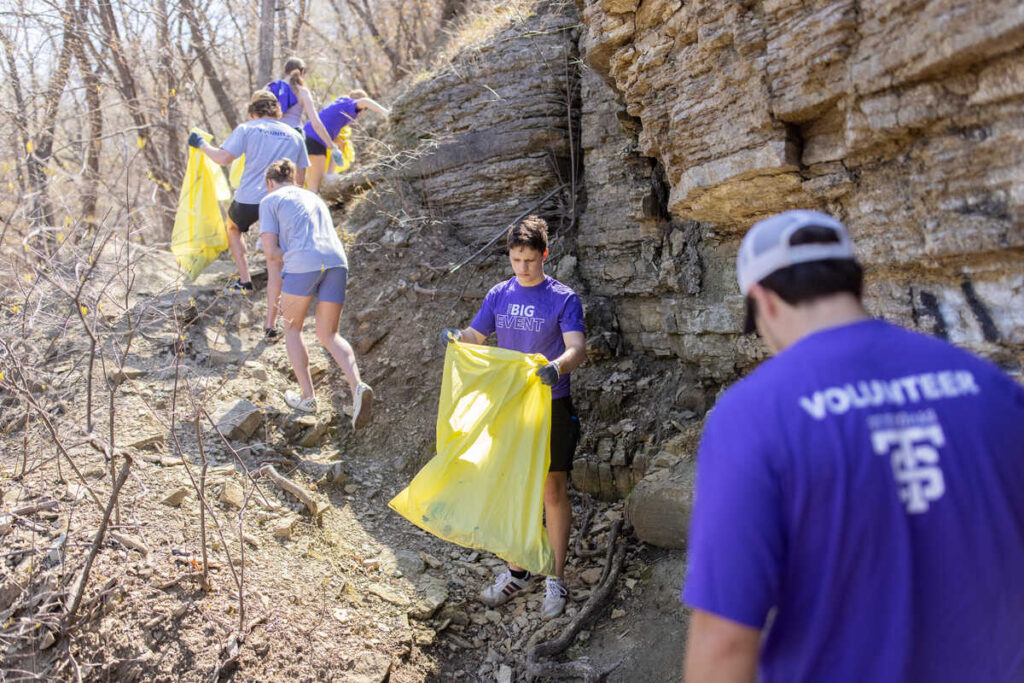Moot court competitions are propelling St. Thomas Law toward a legacy of excellence in intellectual property. In 2020, St. Thomas Law took first place at the USPTO National Patent Application Drafting Competition in its debut appearance at the event. The law school’s IP Moot Court teams have advanced to the American Intellectual Property Law Association (AIPLA) national Giles Sutherland Rich Memorial Moot Court competition each year since 2018.
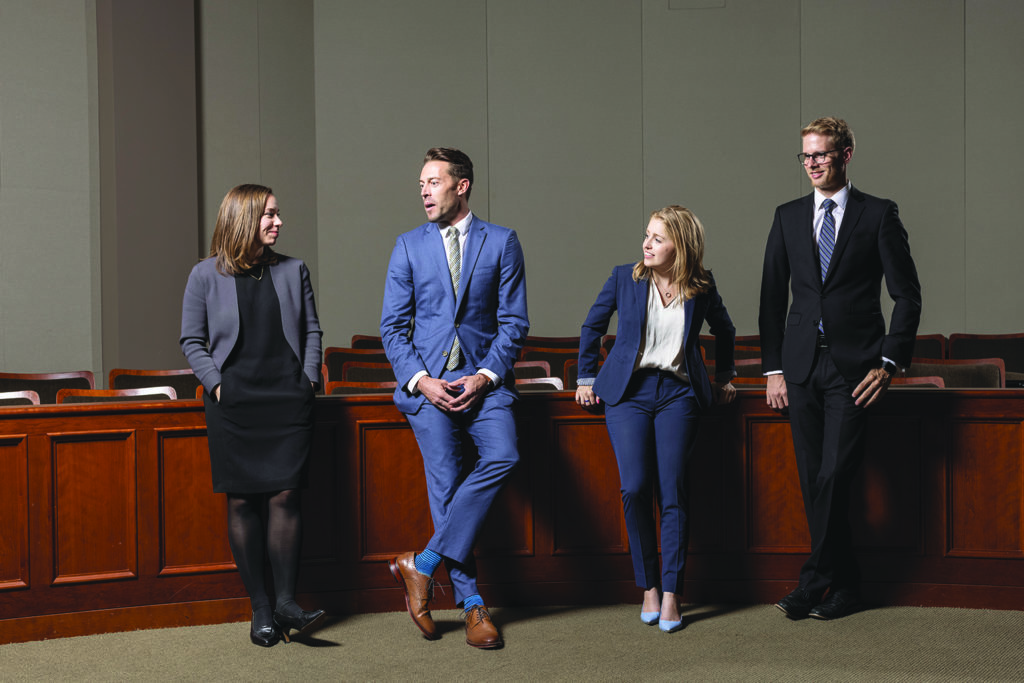
St. Thomas’ winning record is due, in part, to the alumni who have engaged with the teams to offer support, and in the case of the IP Moot Court team, serve as coaches.
Alumna Lea Westman '15 J.D. came onboard as a coach in 2017. It had only been three years prior when she was sitting in the student seat for a different moot court competition.
However, “in it to win it” was not the mantra top of mind for Westman when she agreed to coach the fledgling St. Thomas team. She simply wanted to give back to St. Thomas by helping law students gain practical experience that would help shape their careers.
Ever since the team first qualified four years ago for the national AIPLA competition in Washington, D.C., some people see St. Thomas Law in a new light.
“Respect for St. Thomas has grown,” said Westman, who is an associate at the law firm Schwegman, Lundberg & Woessner P.A. in Minneapolis. “The first year I was coaching it was like pulling teeth to try to get people to show up and guest judge. Now, in September and October, I get calls and emails from people at a large number of IP firms in the Cities who ask ‘when is moot court starting, I’d love to come back and see your students.’
“Within the Twin Cities community there’s an understanding that there’s an excellent caliber of students at St. Thomas,” Westman added. “Definitely within the intellectual property community, they are recognized here in the Cities. It will be a matter of time before we can build that relationship more broadly.”
Luke Toft '13 J.D., who practices intellectual property law and was a coach for two seasons starting in fall 2017, said when St. Thomas went to nationals again the second year, it made an impact at some firms, as they are taking a closer look at St. Thomas. “I was the only St. Thomas alum at Fox Rothschild in the Minneapolis office when I started. And today there are five or six of us. It has grown quite a bit. Two of our summer interns last year were St. Thomas students.”
A way to give back to St. Thomas
Having alumni involved in moot court as coaches and guest judges helps to raise awareness of St. Thomas with the partners at their firms. It’s a benefit, but not the reason Lee Bennin '19 J.D. signed on to be a coach.
Bennin was a 2L when he and his 3L teammate Jay Singh '18 J.D. achieved first place, were awarded the “Best Brief” award in the Midwest Regional Competition, and were quarterfinalists at the AIPLA national competition. Bennin returned to the competition the following year, where he and Kiersten Idzorek ’20 J.D. again reached the national quarterfinals.
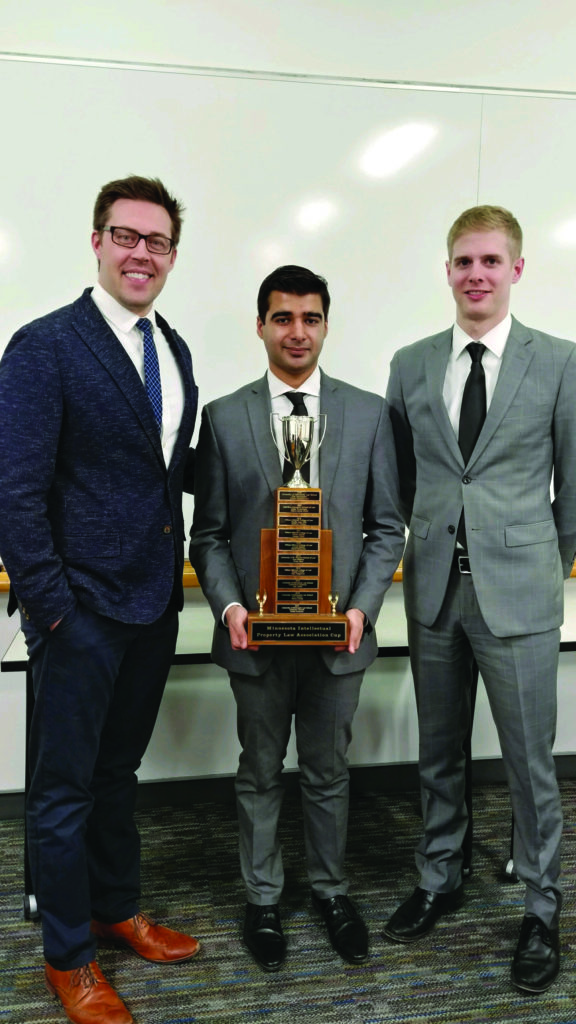
“My experience on the IP Moot Court team helped me earn a clerkship at the Minnesota Court of Appeals,” said Bennin, who is now an associate at Lathrop GPM. Bennin rejoined the team as a coach in 2019, where he contributes his firsthand understanding of the appellate process and guides students through the unique aspects of writing at the appeals court level. “I decided to become a coach because I was active in the IP Moot Court program during law school and I wanted to give back to the team that helped me develop my lawyering skills.”
Regardless of specialty, there are plenty of opportunities for alumni to get involved, grow their own careers and shine a light on St. Thomas, all while mentoring the next generation.
“I think especially for the first several years out of law school when you are cutting your teeth on new experiences, the opportunity to turn around and teach helps to crystallize a lot of the skills and tips you are working on and it becomes a lesson for you at the same time,” said Anne Rondoni Tavernier '16 J.D., a coach Westman recruited for the 2017-18 academic year.
Lessons that Tavernier practiced in her trial advocacy competition course when she was a St. Thomas Law student are ones she relayed to her mentees, but at the same time, she was driving home the point for herself, she said. An example, she mentioned, is “when a judge asks you a question and you don’t know how to respond, you pause, and take time to think and go back to your notes. It is helpful from a practical development standpoint.”
Coaching also helped Tavernier, a senior associate, grow closer with her colleagues at Fredrikson & Byron, P.A.
“My law firm was thrilled when they learned [I was coaching]. They all wanted to be guest judges,” she said. “Coaching is really a great opportunity for the students, and it is a fun bonding opportunity to get to know some of your own colleagues outside of the office.
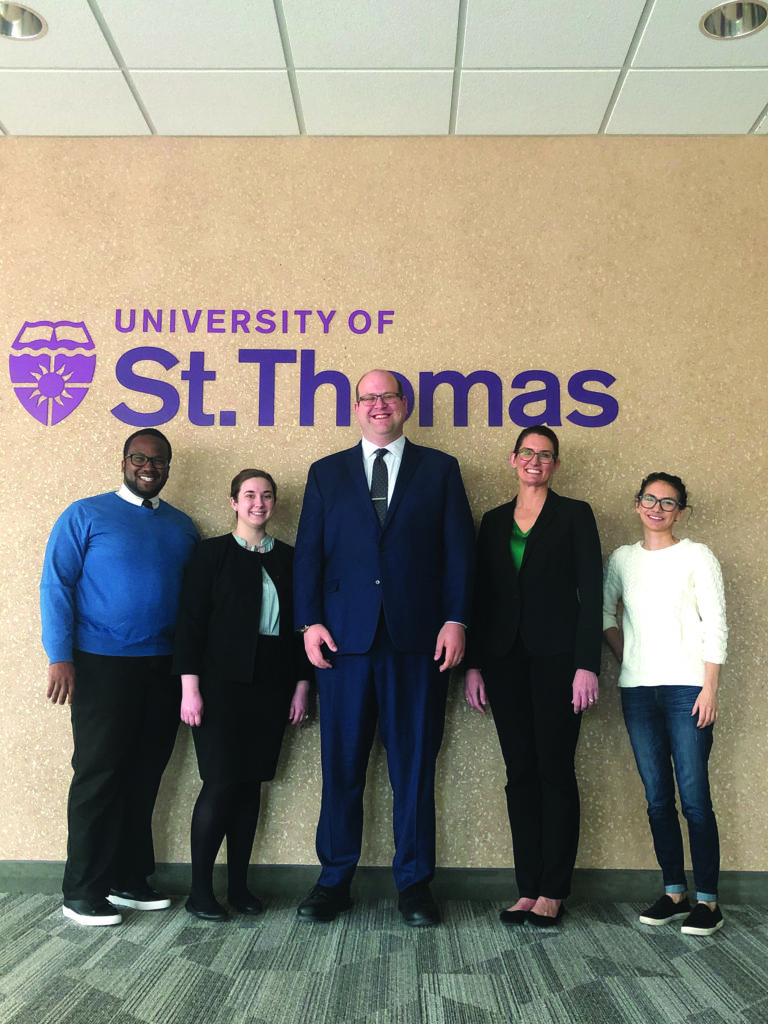
Pictured (l to r) in 2020: Coach Darnell Cage, Kiersten Idzorek '20 J.D., Mark Landauer '20 J.D., Mary Susan Gerber '21 J.D. and Jessica Gutierrez Alm.
Toft, who became a guest coach in subsequent years, agrees. “Getting involved like this is an easy way to force yourself into networking. If that’s not something that you’re good at, this is a great opportunity for you because not only do you make a connection with your students, not only will you make a connection with the other coaches, but you also work on getting people from your own firms involved. Ask them, ‘Hey, will you come guest coach this thing for me?’ People are willing to do it. Plus, it’s an excuse to reach out and then maybe grab a happy hour or lunch afterwards.”
Boost your career
Toft was a mid-level associate when he started coaching. Being a coach, “probably did help my elevation to partnership this last spring,” he said. “Firms, especially large firms, do care what you do outside of the billable, and for Fox Rothschild, it is no exception. There are different categories or buckets that are important to them when going up for partnership and one of them is involvement as a citizen of the community. It’s probably not a deciding factor, but it definitely helps being able to say ‘these are things that I do in the community to give back.’”
Learning to edit and give feedback on the writing of others is a good skill set to learn, Toft said. Coaching helped him transition into a place where he would assign work to younger associates at his firm. It also helped in other ways.
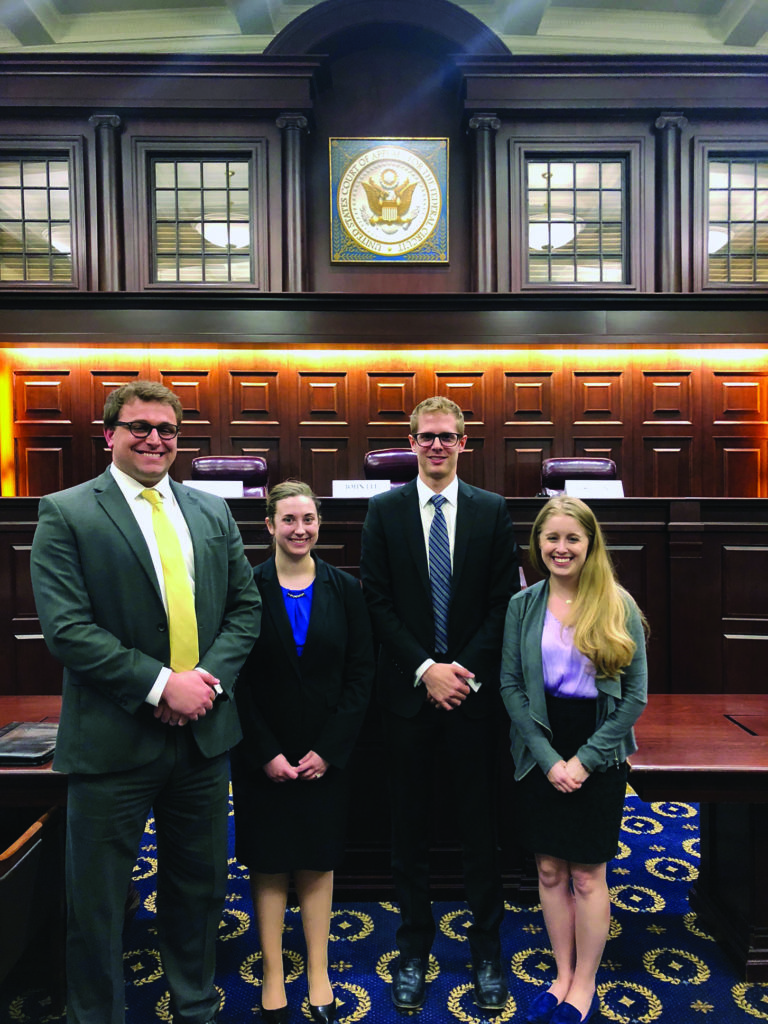
“It is surprising how often a question [that arises for moot court projects] relates to a practice that I had in a case,” he said. “One year when I was guest coaching, I took the brief with me and used some of the case law that they had already done as a jumping off point for my associates to start looking into for a very similar issue. So, [coaching] can be helpful in staying up to date on the issues that are being addressed in the legal community in that moment.”
Toft encourages others to consider coaching IP Moot Court. “IP doesn’t have to be the area of your specialization. We are all smart individuals, and we see how to best approach the issues. How you lay out a brief is going to be the same, how you attack oral arguments is going to be the same. Anyone can do it and bring a perspective that will be helpful to the competition.”
“At the end of the day, my attitude has always been to give my students the tools to succeed,” said Westman, who has started her fifth year of coaching the IP Moot Court team and is not making predictions about advancing to nationals.
“Don’t get me wrong, winning is great. The prestige is great for St. Thomas, the students, the firms and the coaches, but it is about giving the students the tools to succeed in their careers and to build relationships. My ultimate goal is to see them succeed long term, both in their careers and just in general as people.”
This story is featured in the fall 2021 issue of St. Thomas Lawyer.
